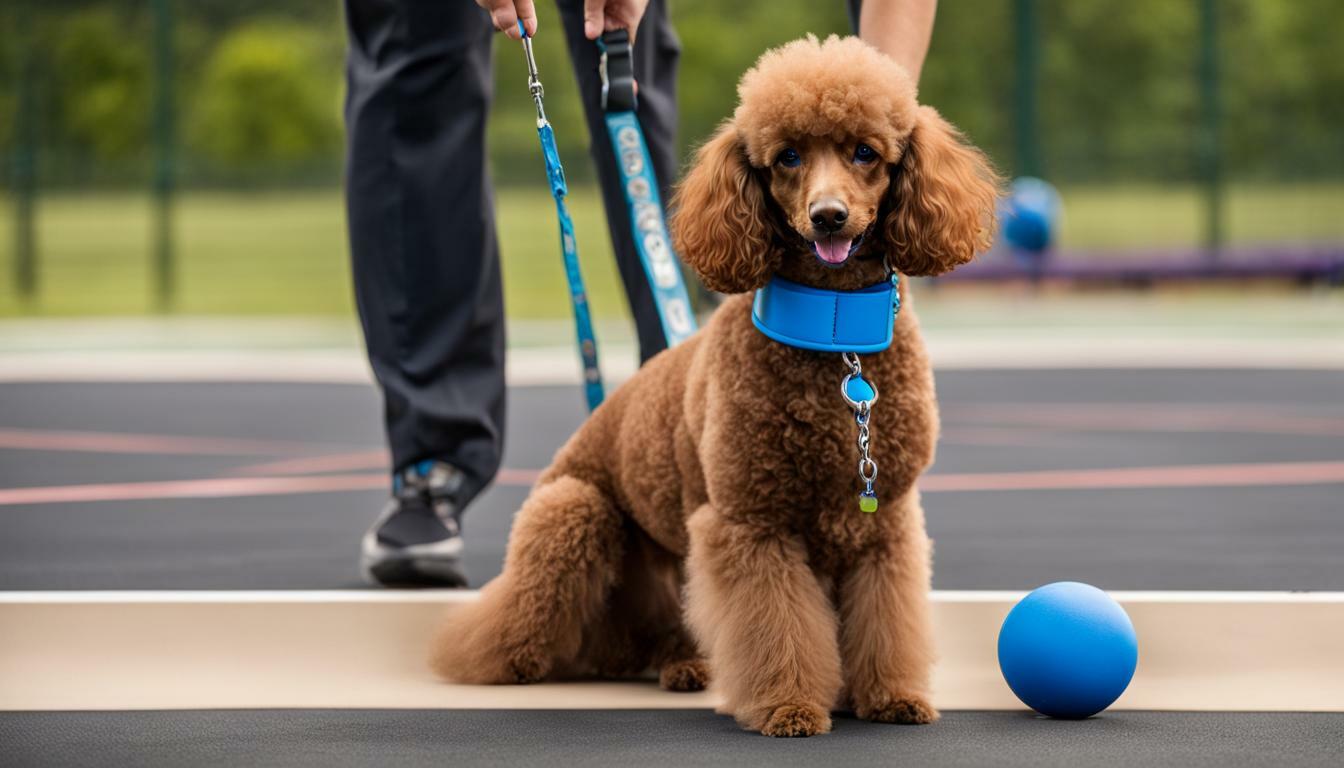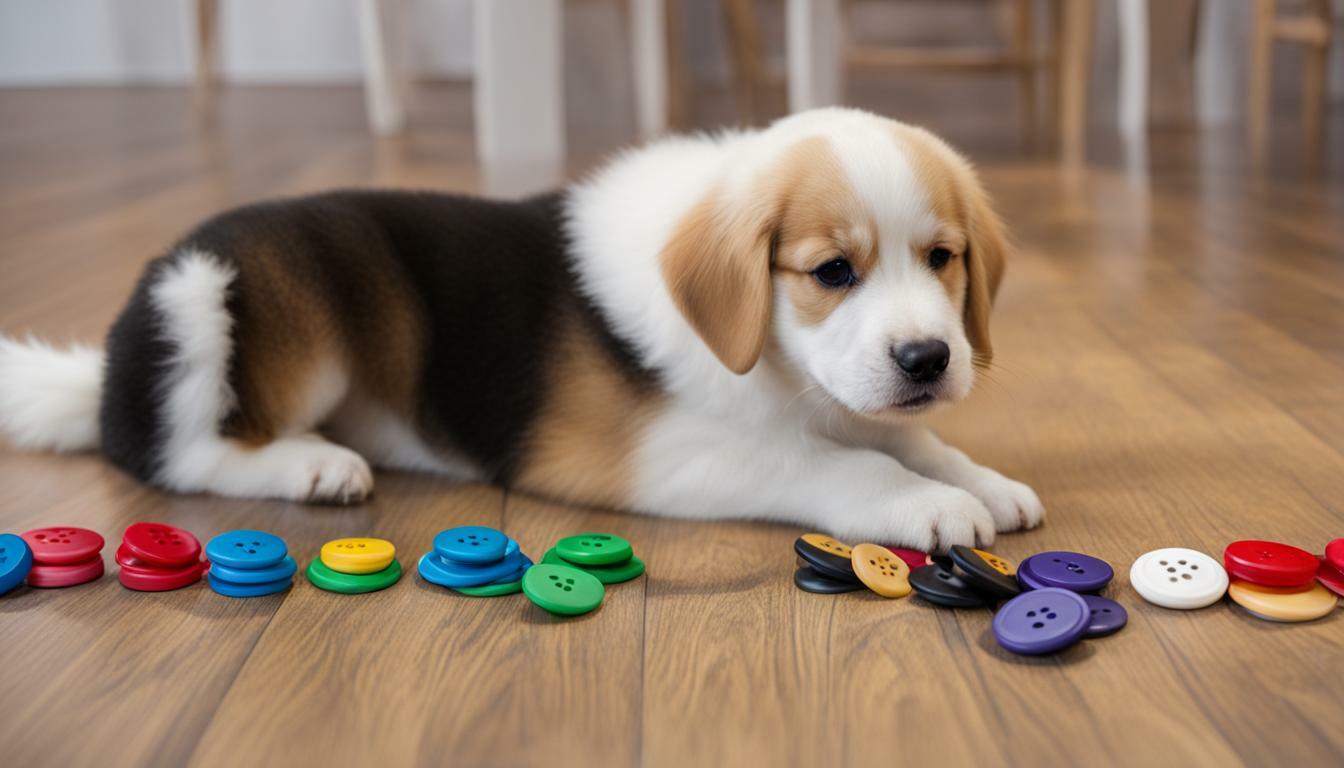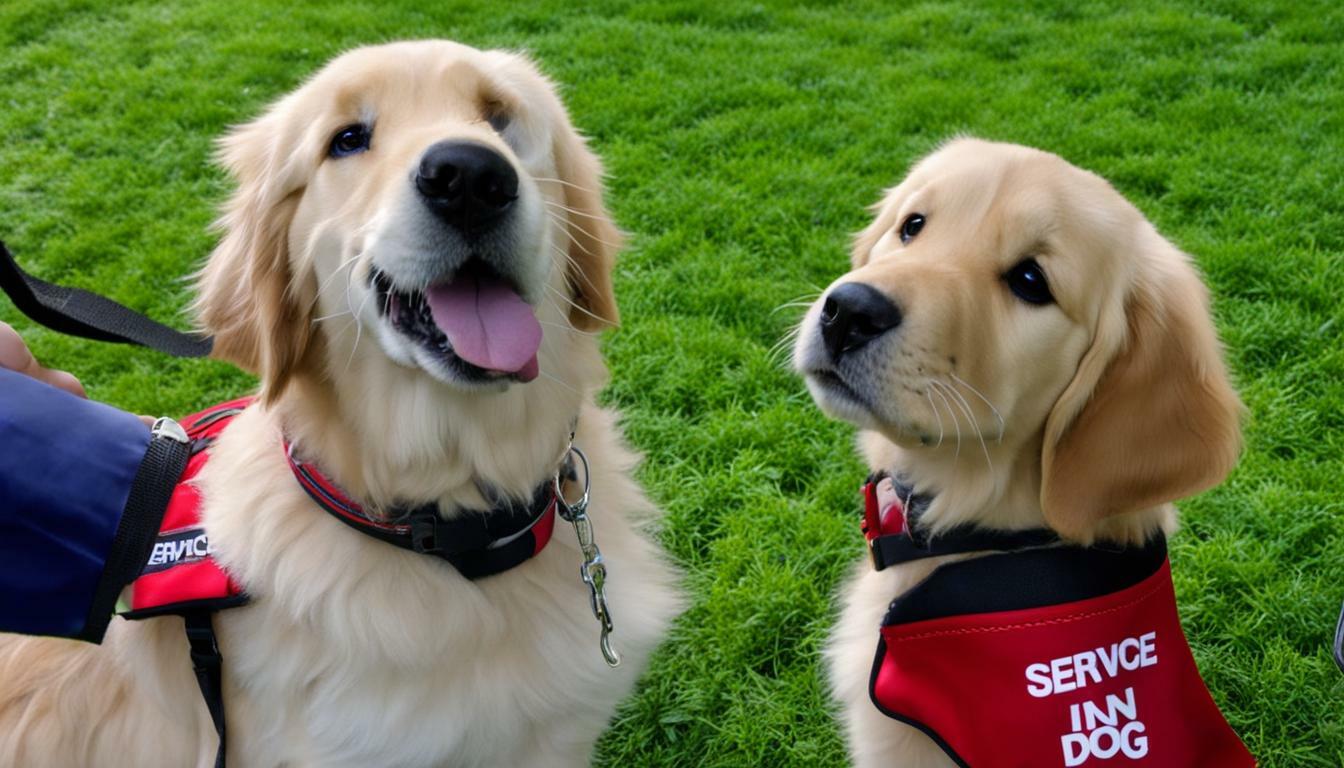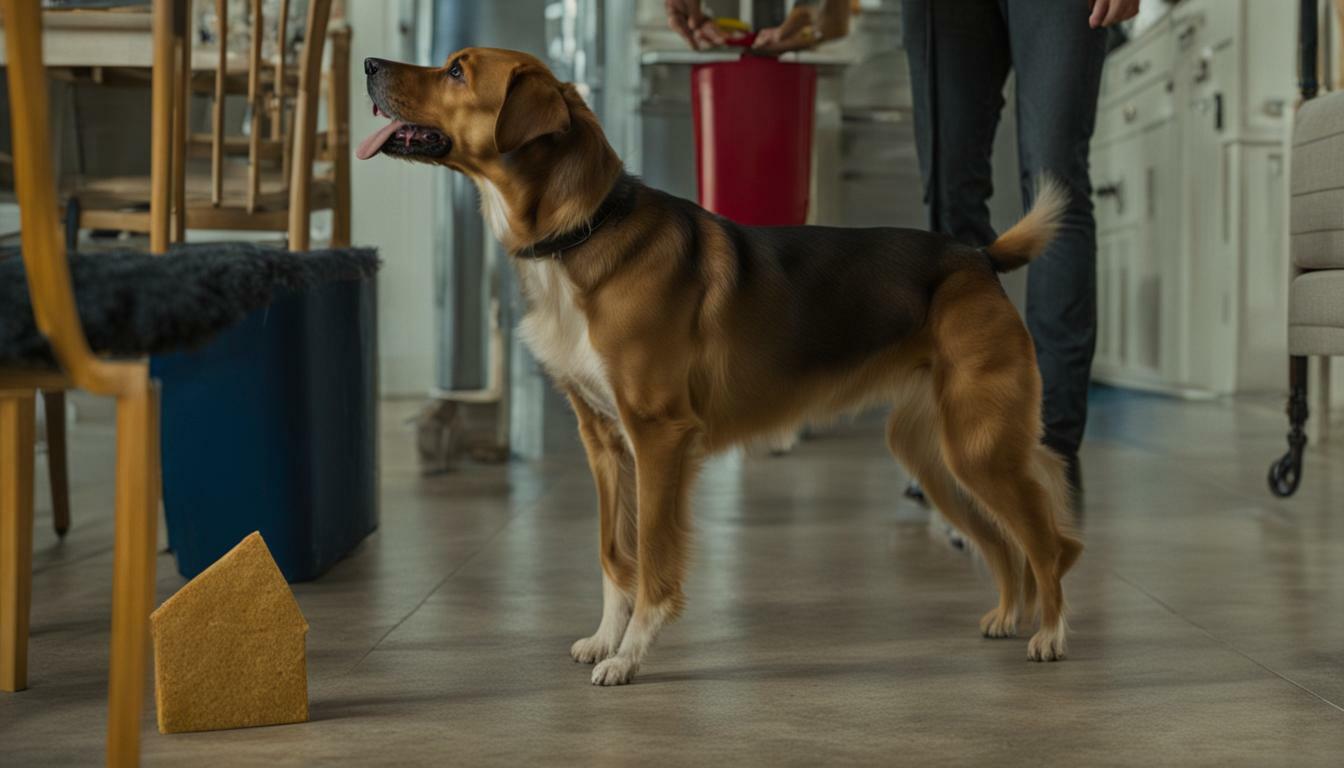Welcome to our comprehensive Poodle training guide, where you’ll learn from the expertise of renowned professional dog handler and groomer, Allison Alexander. With over 30 years of experience, Allison has perfected the art of presenting and handling Poodles, earning her top awards and recognition worldwide. She has groomed and handled numerous top-winning Poodles, establishing herself as a leading authority in the field.
As the founder of the Leading Edge Dog Show Academy and creator of the Global Poodle Summit, Allison has dedicated her career to sharing her knowledge and expertise. Her passion for Poodles and commitment to their well-being shines through in her comprehensive guide, which will equip you with the essential skills to train your Poodle effectively.
- Learn from the expertise of professional dog handler and groomer, Allison Alexander.
- A comprehensive guide that covers all aspects of Poodle training.
- Unlock your Poodle’s potential through effective training techniques.
- Discover strategies for obedience training, tricks, house training, and more.
- Consider enrolling in professional Poodle training classes for additional guidance.
Why Poodle Training is Essential for a Well-Behaved Pet
Poodle training techniques are essential for fostering obedience and ensuring your four-legged friend exhibits well-behaved behavior. Without proper training, Poodles can become unruly and disobedient, leading to a strained relationship between you and your pet. By investing time and effort into training your Poodle, you can establish a strong bond and create a harmonious living environment.
Training your Poodle not only promotes good behavior but also helps in developing their mental and physical capabilities. Poodles are highly intelligent dogs that thrive on mental stimulation. By providing them with structured training, you can keep their minds active and prevent boredom, which often leads to destructive behaviors.
There are various Poodle training techniques that you can employ to teach your furry friend the desired behaviors. From basic commands like sit, stay, and come to more advanced tricks and tasks, the possibilities are endless. It is crucial to start training early and be consistent in your approach to reap the full benefits of training.
Whether you choose to train your Poodle at home or opt for professional guidance, the key lies in positive reinforcement and patience. Rewarding good behavior with treats, praise, and playtime will motivate your Poodle to continue learning and obeying commands. Remember, each dog is unique, so it’s important to tailor the training approach to suit your Poodle’s personality and learning style.
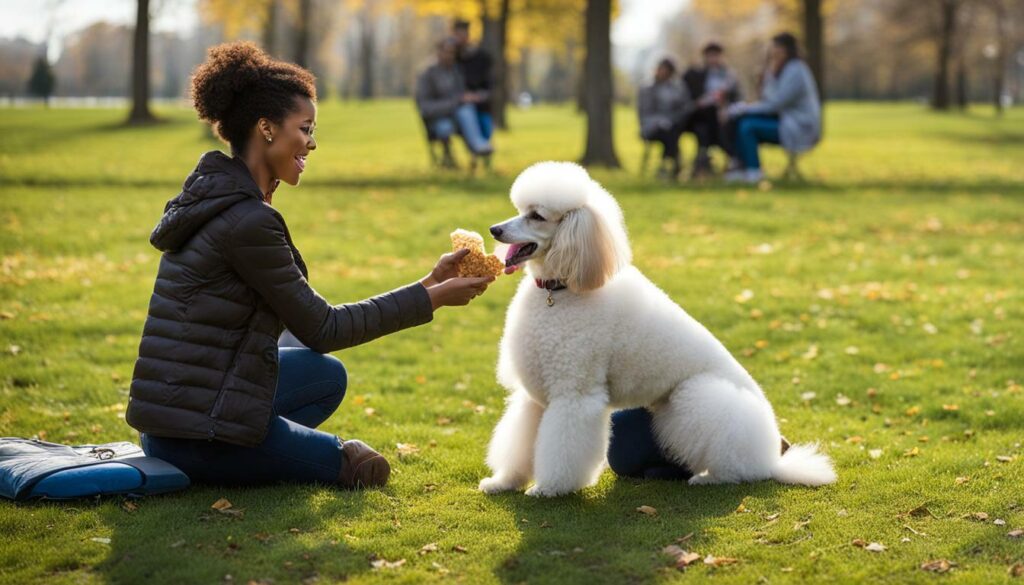
When you invest time and effort in training your Poodle, you can enjoy a wide range of benefits. Not only will you have a well-behaved pet, but you’ll also strengthen the bond between you and your furry friend. Here are some key advantages of Poodle training:
- Improved obedience: Training instills discipline in your Poodle, making them more obedient and responsive to commands.
- Enhanced communication: Effective training enables clear communication between you and your Poodle, ensuring they understand your expectations.
- Reduced behavioral issues: Training helps address and prevent common behavioral problems, such as excessive barking, biting, and aggression.
- Increased mental stimulation: Poodles thrive on mental stimulation, and training provides them with the challenge and engagement they need to stay happy and healthy.
- Stronger bond: Training sessions create opportunities for bonding and trust-building, strengthening the unique connection between you and your Poodle.
| Training Tip | Description |
|---|---|
| Start early | Begin training your Poodle as early as possible to establish good habits and prevent behavior problems. |
| Be consistent | Consistency is key in training; use the same commands, rewards, and consequences to reinforce desired behavior. |
| Use positive reinforcement | Reward your Poodle with treats, praise, and playtime when they exhibit desired behaviors to encourage them to continue learning. |
| Patience is key | Training takes time and patience; remain calm and composed, and avoid getting frustrated with your Poodle. |
Effective Strategies for Poodle Obedience Training
Discover the best Poodle training tips and effective strategies for obedience training that will help you build a strong bond with your furry companion. Poodles are known for their intelligence and eagerness to learn, making them highly trainable. With the right approach, you can teach your Poodle essential obedience commands and ensure they become a well-behaved and well-adjusted member of your family.
One of the most important aspects of Poodle obedience training is consistency. Establish a clear set of rules and expectations for your Poodle and stick to them. Use positive reinforcement techniques such as treats and praise to reward desired behaviors and discourage unwanted ones. Consistency and positive reinforcement will help your Poodle understand what is expected of them and make the training process more enjoyable for both of you.
While some basic commands like sit, stay, and come are essential for every dog, Poodles thrive on mental stimulation and enjoy learning new tricks. Incorporating trick training into your obedience training sessions can help keep your Poodle engaged and mentally stimulated. From rollovers to high-fives, there are countless tricks you can teach your Poodle to impress friends and family.
| Tip | Description |
|---|---|
| Start Early | Begin training your Poodle as soon as you bring them home. Early socialization and obedience training are crucial for shaping their behavior as they grow. |
| Use Positive Reinforcement | Reward your Poodle with treats, praise, and playtime when they exhibit desired behaviors. This positive reinforcement will motivate them to continue obeying your commands. |
| Be Patient | Training takes time and patience. Avoid punishment or harsh methods, as they can damage the trust between you and your Poodle. |
| Be Consistent | Consistency is key in Poodle obedience training. Use the same commands and reward system every time to avoid confusion. |
For those seeking additional guidance or struggling with training their Poodle, professional Poodle training classes can be beneficial. These classes provide expert guidance and offer opportunities for your Poodle to socialize with other dogs. The structured environment of a training class can help reinforce training techniques and ensure your Poodle’s success.
Mastering Poodle Tricks for Fun and Mental Stimulation
Unleash your Poodle’s intelligence and have fun by mastering a wide range of tricks through our expert training techniques. Poodles are known for their high level of intelligence and eager-to-please nature, making them perfect candidates for learning and performing tricks.
Whether you want your Poodle to weave through your legs, play dead, or jump through hoops, our comprehensive guide has you covered. With step-by-step instructions and expert tips, you’ll be amazed at how quickly your Poodle can master these impressive tricks.
One trick that Poodles excel at is balancing objects on their nose or paws. It’s not only entertaining to watch but also provides mental stimulation for your furry friend. Start by teaching them the basic command “wait” and gradually introduce objects for them to balance. With patience and practice, you’ll soon have a Poodle who can balance a treat or a toy with precision.
Table: Impressive Tricks for Your Poodle
| Trick Name | Description |
|---|---|
| Roll over | Teach your Poodle to roll over on command, showcasing their flexibility and agility. |
| Spin | Show off your Poodle’s coordination by teaching them to spin in a circle. |
| Fetch | Train your Poodle to retrieve objects and bring them back to you, perfect for a game of fetch. |
| Wave | Impress your friends by teaching your Poodle to wave hello or goodbye on command. |
| Crawl | Get your Poodle to crawl on their belly, showcasing their obedience and patience. |
Remember, training should always be a positive and rewarding experience for your Poodle. Use plenty of treats, praise, and patience to encourage them along the way. Celebrate each small milestone, and soon enough, your Poodle will be performing these tricks with confidence and enthusiasm.
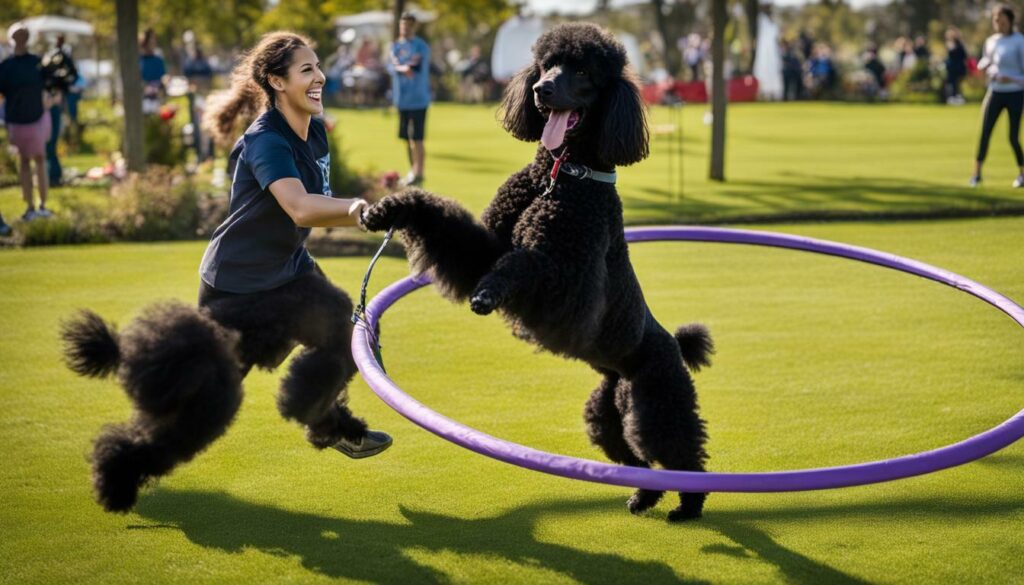
So, why wait? Dive into our comprehensive guide and start mastering Poodle tricks today. You’ll not only enhance your bond with your Poodle but also provide them with the mental stimulation they crave.
Crate Training Poodles: A Step-by-Step Approach
Crate training can be a valuable tool for Poodle owners, and we’ll guide you through the step-by-step process to ensure a positive and successful crate training experience. Crate training provides a safe and secure space for your Poodle, mimicking the den-like environment they naturally seek. It also helps with potty training and prevents destructive behavior when you can’t supervise your pup. Let’s explore how to crate train your Poodle effectively.
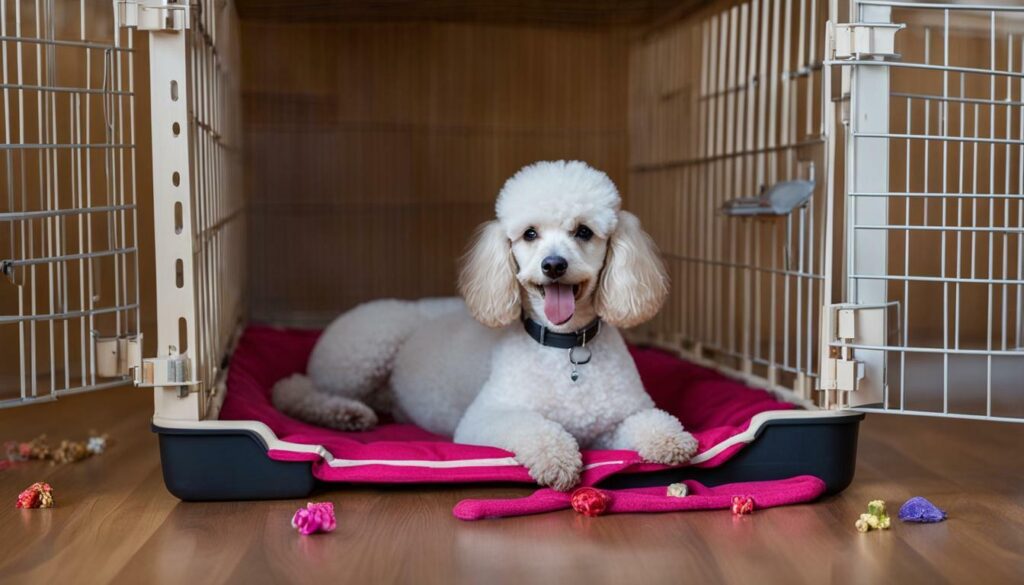
Start by introducing the crate as a positive and inviting space. Place it in a central area of your home where your Poodle can see and feel part of the family. Line the crate with comfortable bedding and leave the door open. Encourage your Poodle to explore the crate by placing treats or toys inside. Gradually increase the time spent inside the crate, ensuring it remains a positive experience.
Step 2: Mealtime in the Crate
Use mealtime to associate the crate with positive reinforcement. Place your Poodle’s food bowl near the crate entrance and gradually move it inside as they become comfortable. Eventually, your Poodle should eat their meals comfortably inside the crate. This step helps create a positive association with the crate and reinforces the notion that it is a safe and rewarding space.
Step 3: Gradual Enclosure
Once your Poodle is comfortable entering and eating inside the crate, you can start closing the door for short periods. Begin by closing the door for a few seconds while your Poodle is inside, gradually extending the time as they become more relaxed. Always reward your Poodle with treats and praise for calm behavior inside the crate. It’s essential to build trust and reinforce positive associations throughout the training process.
| Training Tip | Do | Don’t |
|---|---|---|
| Provide a comfortable and cozy bedding inside the crate. | Make the crate a positive and rewarding space for your Poodle. | Force or rush your Poodle into the crate. |
| Use treats and praise to reward your Poodle for calm behavior inside the crate. | Extend the time your Poodle spends in the crate gradually. | Leave your Poodle inside the crate for prolonged periods without breaks. |
| Make the crate a part of your Poodle’s daily routine. | Keep the crate in a central area where your Poodle can feel connected. | Punish or scold your Poodle for any accidents or undesirable behavior inside the crate. |
House Training Tips for Poodles: From Potty Training to Indoor Etiquette
From potty training to indoor etiquette, our house training tips will help you establish a well-behaved and house-friendly Poodle. Poodles are intelligent and eager to please, making them highly trainable. With a consistent and positive approach, you can quickly teach your Poodle the appropriate behaviors for living indoors.
Potty Training:
The first step in house training your Poodle is to establish a routine for potty breaks. Take your Poodle outside to a designated area immediately after waking up, after meals, and before bedtime. Use a cue word or phrase, such as “go potty,” to associate with the act of elimination. Reward your Poodle with praise and treats when they successfully go potty outside. If accidents happen indoors, clean them up thoroughly to eliminate any lingering scent that may attract your Poodle back to that spot.
Indoor Etiquette:
To teach your Poodle good manners indoors, start by crate training. A crate provides a safe and secure space for your Poodle when you’re unable to supervise them. Introduce the crate gradually, making it a positive and comfortable space with bedding, toys, and treats. Use the crate for short periods initially, gradually increasing the time as your Poodle becomes more comfortable. Always associate positive experiences with the crate to prevent any negative associations.
| House Training Tips for Poodles | Key Takeaways |
|---|---|
| Establish a routine for potty breaks | Consistency is key in potty training |
| Reward your Poodle for going potty outside | Positive reinforcement helps reinforce desired behavior |
| Use a crate for indoor etiquette training | A crate provides a safe and secure space for your Poodle |
| Introduce the crate gradually and make it a positive space | Positive associations with the crate help prevent anxiety |
By following these house training tips, you can ensure a harmonious living environment with your Poodle. Consistency, positive reinforcement, and patience are key in establishing good habits. With time and effort, your Poodle will become a well-behaved and house-friendly companion.
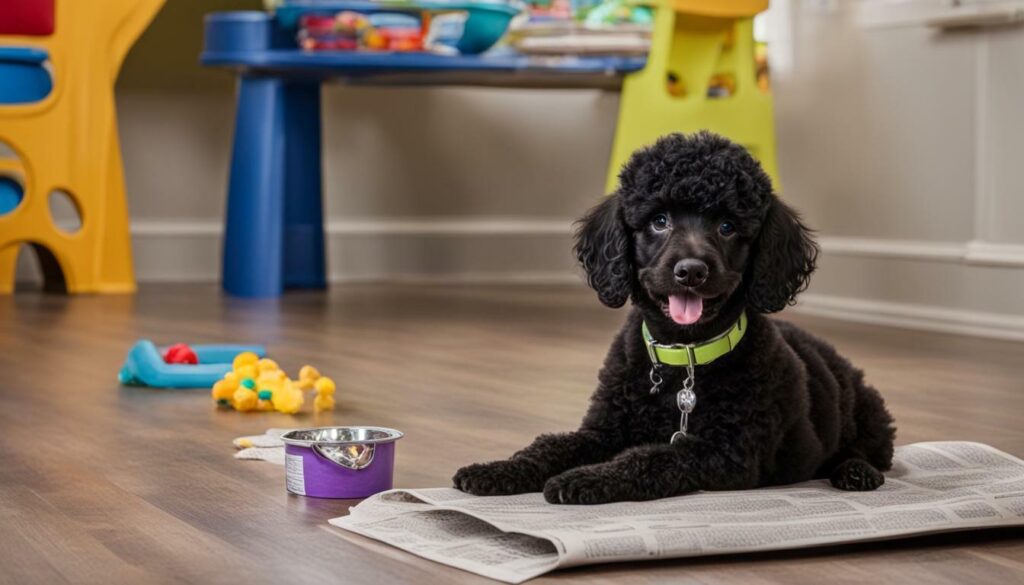
Establishing a well-structured and consistent training schedule is key to achieving successful results in your Poodle’s training journey. By following a set routine, you can effectively teach your Poodle new commands, reinforce existing behaviors, and address any specific training needs your dog may have. A training schedule provides the framework for your dog’s learning process and helps create a sense of routine and predictability.
To create a successful Poodle training schedule, consider the following factors:
- Time commitment: Allocate dedicated slots of time for training sessions throughout the day. Shorter, more frequent sessions are typically more effective than long, sporadic ones.
- Consistency: Stick to the same schedule every day to reinforce good habits and prevent confusion. Consistency helps your Poodle understand what is expected of them.
- Variety: Incorporate a mix of obedience training, trick training, and mental stimulation activities to keep your Poodle engaged and motivated.
Here’s an example of a well-structured Poodle training schedule:
| Time | Activity |
|---|---|
| Morning | 10-minute obedience training session (focus on basic commands such as sit, stay, and down) |
| Afternoon | 15-minute trick training session (teach your Poodle new tricks such as roll over, shake hands, or play dead) |
| Evening | 10-minute mental stimulation activity (use treat puzzles or interactive toys to challenge your Poodle’s problem-solving skills) |
The key is to adapt the training schedule based on your Poodle’s individual needs and energy level. Some Poodles may benefit from longer training sessions or additional activities, while others may require shorter, more frequent sessions.
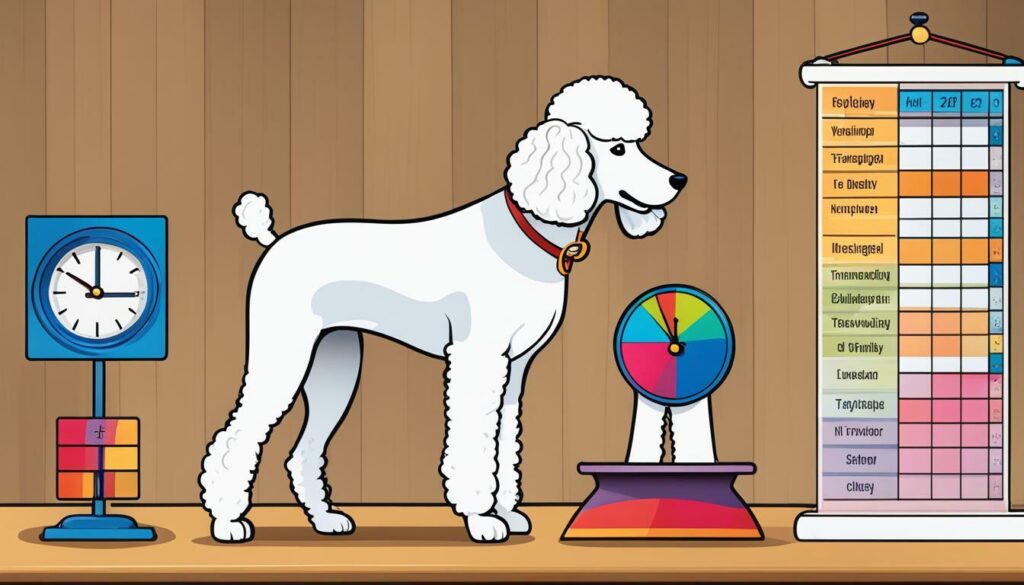
Remember, training is an ongoing process, and consistency is key. With a well-structured training schedule, patience, and positive reinforcement, you can unlock your Poodle’s full potential and create a well-behaved and happy companion.
The Benefits of Professional Poodle Training Classes
Explore the advantages of professional Poodle training classes and discover how they can enhance your training experience while providing valuable socialization opportunities for your furry companion. Enrolling your Poodle in a professional training class can be a game-changer for both you and your pet. Not only will you gain access to expert guidance and insights, but your Poodle will also benefit from the structured environment and interaction with other dogs.
Professional Poodle training classes offer a structured and supportive environment that allows you to focus on specific training goals. Whether you’re looking to teach your Poodle basic obedience commands or more advanced tricks, these classes provide a platform where you can learn effective training techniques from experienced trainers. The guidance and feedback from professionals will help you understand your Poodle’s unique needs and tailor your training approach accordingly.
Attending training classes with other Poodle owners and their dogs can also provide valuable socialization opportunities. It allows your Poodle to interact with different breeds, temperaments, and energy levels, helping them develop proper social skills and manners. Additionally, the controlled environment of a training class ensures that your Poodle learns to focus and respond to commands even with distractions around, which is essential for their overall obedience and behavior training.
| Benefits of Professional Poodle Training Classes: |
|---|
| Expert guidance and insights |
| Structured environment for focused training |
| Interaction with other dogs for socialization |
| Learn effective training techniques |
| Develop proper social skills and manners |
| Foster focus and response to commands in distracting environments |
Investing in professional Poodle training classes not only helps you build a strong bond with your four-legged friend but also equips you with the knowledge and skills to overcome common training challenges. With the right training approach and support, you can ensure that your Poodle reaches their full potential and becomes a well-behaved, happy, and confident companion.
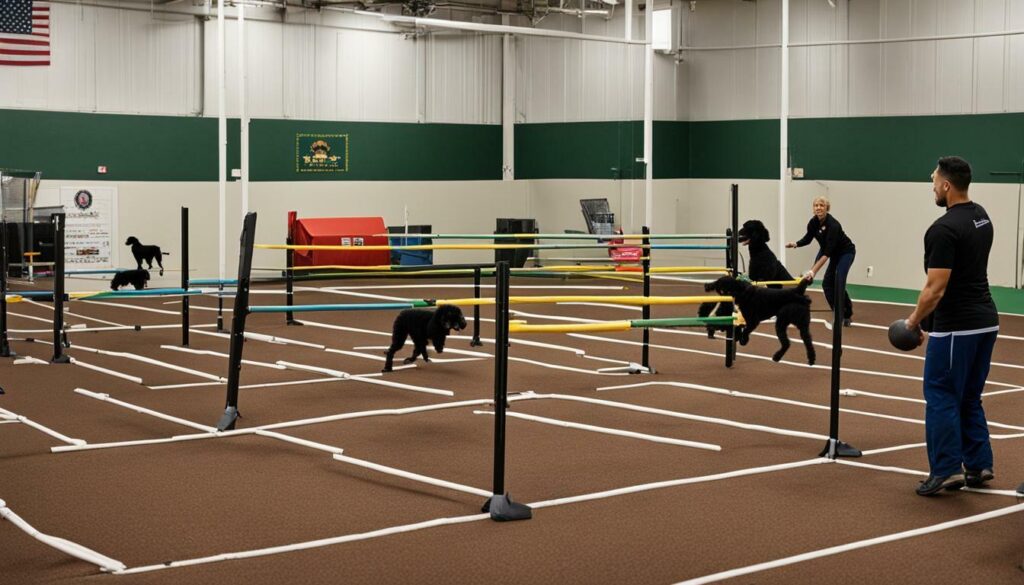
Gain expert insights into behavior training techniques that will help you address common challenges faced by Poodles and create a harmonious household. Poodles are known for their intelligence and lively personalities, but they can also present some unique behavior challenges.
One common challenge faced by Poodle owners is separation anxiety. Poodles are highly social dogs and can become anxious when left alone for extended periods. To address this issue, it’s essential to gradually acclimate your Poodle to being alone by practicing short periods of separation and gradually increasing the time. Providing mental stimulation through puzzle toys or interactive games can also help alleviate anxiety during alone time.
Another challenge that Poodle owners may encounter is excessive barking. Poodles are alert and vocal dogs, but excessive barking can become problematic. It’s important to identify the underlying cause of the barking, whether it’s boredom, fear, or territorial behavior. Once the cause is identified, you can employ positive reinforcement techniques, such as rewarding quiet behavior, to discourage excessive barking.
Poodles are also prone to digging behavior, which can be frustrating for owners. Digging is often a result of boredom or excess energy. To address this behavior, it’s important to provide your Poodle with plenty of physical and mental exercise. Engaging your Poodle in activities such as obedience training, agility, or interactive play can redirect their energy and discourage digging behavior.
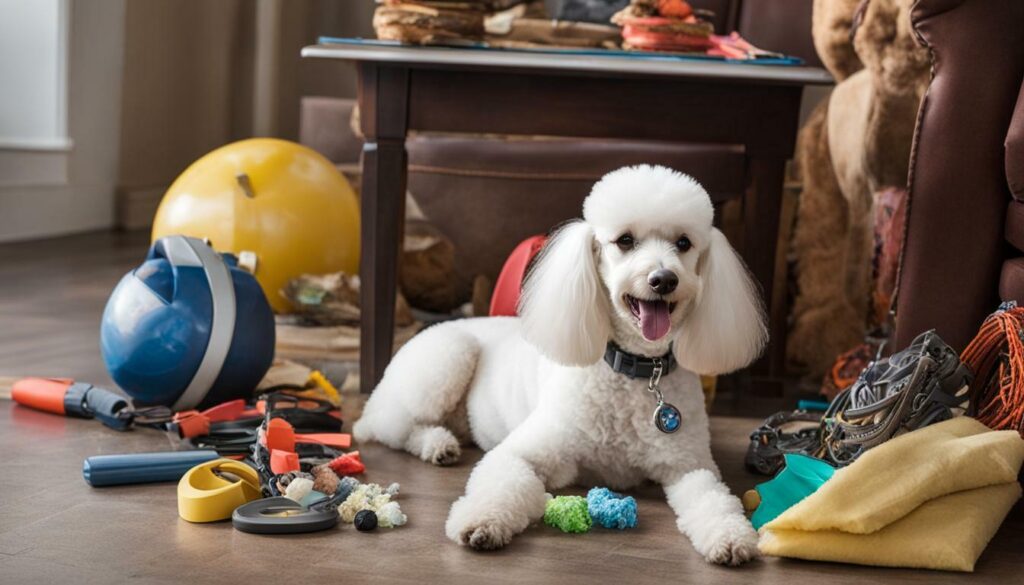
| Common Poodle Behavior Challenges | Training Techniques |
|---|---|
| Separation anxiety | Gradual acclimation to alone time, mental stimulation |
| Excessive barking | Identify underlying cause, positive reinforcement |
| Digging behavior | Provide physical and mental exercise, redirect energy |
Summary:
When it comes to addressing common behavior challenges in Poodles, gaining expert insights into behavior training techniques is crucial. By gradually acclimating your Poodle to alone time, identifying the underlying causes of excessive barking, and providing ample physical and mental exercise to discourage digging behavior, you can create a harmonious household and foster a well-behaved Poodle.
Conclusion: Unleash Your Poodle’s Potential Through Training
Congratulations on completing our comprehensive Poodle training guide! With the techniques shared, you are now equipped to unleash your Poodle’s full potential through effective and rewarding training methods.
Mastering the art of Poodle training is a journey that requires patience, consistency, and understanding. Whether you are a first-time Poodle owner or a seasoned enthusiast, our guide provides you with the knowledge and tools necessary to establish a strong bond with your furry companion.
By following the guidance of Allison Alexander, a renowned professional in the field of Poodle handling and grooming, you can tap into the secrets of successful training. Allison’s years of experience and expertise have helped her achieve remarkable results with Poodles, earning her prestigious accolades and recognition around the world.
With our comprehensive guide, you will gain insights into effective strategies for obedience training, tricks for mental stimulation, and tips for house training and crate training. Additionally, we encourage you to explore the benefits of professional training classes, as they provide expert guidance and valuable socialization opportunities for your Poodle.
The journey of training your Poodle is not only beneficial for their development but will also strengthen the bond between you and your furry friend. So, dive into our comprehensive guide, apply the techniques learned, and watch as your Poodle thrives and reaches their full potential.
FAQ
Q: Why is Poodle training essential for a well-behaved pet?
A: Poodle training is essential for a well-behaved pet because it helps establish obedience and strengthens the bond between the owner and the Poodle. Proper training ensures that the Poodle can follow commands and exhibit good behavior in various situations.
Q: What are some effective strategies for Poodle obedience training?
A: Some effective strategies for Poodle obedience training include positive reinforcement, consistency, and patience. It is also beneficial to enroll in professional Poodle training classes where expert guidance can be provided.
Q: How can I teach my Poodle tricks for mental stimulation?
A: To teach your Poodle tricks for mental stimulation, start with basic commands such as sit, stay, and come. Then gradually introduce more advanced tricks like roll over or play dead. Use positive reinforcement and reward-based training methods.
Q: How do I crate train my Poodle?
A: Crate training your Poodle involves introducing the crate as a positive and safe space for the dog. Start by gradually getting the Poodle accustomed to the crate, using treats and praise. Gradually increase the amount of time spent in the crate and ensure the Poodle feels comfortable and secure.
Q: What are some house training tips for Poodles?
A: House training Poodles involves establishing a consistent routine, taking the Poodle outside frequently, and rewarding successful potty breaks. It is important to be patient and consistent during the house training process.
Q: How can I create a successful Poodle training schedule?
A: To create a successful Poodle training schedule, allocate specific times for obedience training, trick training, and other aspects of training. Be consistent with the schedule and make sure to provide regular exercise and mental stimulation for the Poodle.
Q: What are the benefits of professional Poodle training classes?
A: Professional Poodle training classes offer expert guidance and the opportunity for socialization with other dogs. They provide a structured learning environment and can help address specific training challenges in a supportive setting.
Q: How can I address common behavior challenges in my Poodle?
A: To address common behavior challenges in Poodles, such as separation anxiety or excessive barking, it is important to understand the root causes of the behavior and use positive reinforcement techniques to modify the behavior. Consulting with a professional dog trainer or behaviorist may also be beneficial.
Q: How can I unleash my Poodle’s full potential through training?
A: By following the comprehensive training techniques discussed in this guide, you can unlock your Poodle’s full potential. Consistency, patience, and positive reinforcement are key to successfully training your Poodle and helping them become the best version of themselves.
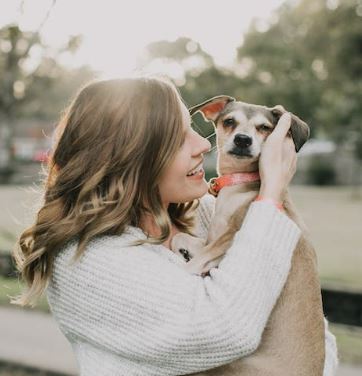
Marissa Delotta, 36, from Dayton, Ohio, is the creative force behind Roverboard.com, a beloved online destination for dog lovers. As a dedicated mom and canine enthusiast, Marissa combines her family experiences with her love for dogs to offer a platform where dog owners can exchange tips, heartwarming stories, and advice. Her website has become a vibrant community for sharing the joys of dog parenting. In her free time, Marissa enjoys exploring dog parks with her family and volunteering at local animal shelters.

